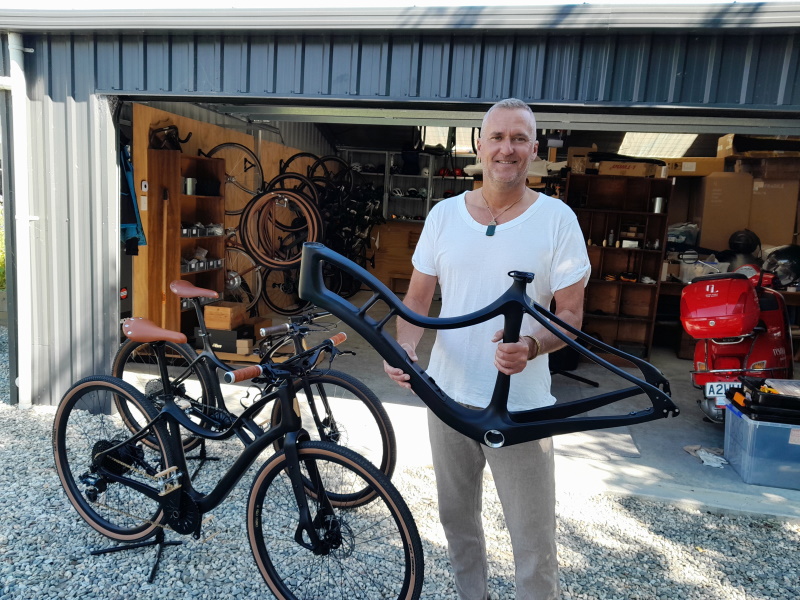
His startup company was recently selected as a finalist for the prestigious Green Product Awards in Berlin, for which public votes close on January 30.
This week, he opened his Wanaka studio doors so cyclists could begin test riding the first six of his bikes, all of which are built from components he designed with his professional cyclist son Carter Guichard.
Le Velo Studio carbon fibre e-bikes weigh in at 12.3kg, about 10kg lighter than a standard e-bike. The frame weighs just 1kg. They are meant to last a lifetime.
Mr Guichard said it set a new standard for performance, sustainability and style, and he understood it was the first time a New Zealand company had reached the finals of the Berlin competition.
‘‘I’m getting quite excited ... This acknowledgement supports our belief that we have created something that will not only enhance the cycling experience for a range of users but also benefits the planet,’’ he said.
Green Product Awards director Nils Bader said in a statement: ‘‘Le Velo Studio’s e-bike, called ‘the bicycle of your life’, in the mobility category is a good example of the level of creativity and passion with which our finalists are contributing to a more sustainable future.’’
Mr Guichard’s backyard garage in Wanaka is now full of boxes of bike components delivered from suppliers in Asia.
He has contracted Wanaka bike mechanics and cyclists Zeff Wadsworth and Scott Rainsford to assist with tasks such as assembly and marketing, and other studio tasks as required.
Since unveiling his prototype to the Otago Daily Times a year ago, he had modified the shape of the frame so it was ‘‘a bit higher, more elegant — we decided to go a bit higher to be more aesthetic’’, Mr Guichard said.
There is also more clearance between the rear wheel and frame and there are 12 speeds instead of 11.
He has designed a rear rack for touring packs, if riders are going long-distance, or bespoke wooden luggage boxes for the round-town shopper.
Customers have a choice of engines, saddles, handlebars and a swappable rear wheel so the bike suits their body type and riding style.
‘‘Because I know Kiwis, they quite like the large handlebars like mountainbike style and the European people like me, they will go for something narrow,’’ Mr Guichard, who is from France, said.
Because the bike is powered by a rear wheel hub rather than a mid-frame battery, it can also be easily used as a push bike if the rider runs out of electric oomph.
‘‘I like to say it has infinite range,’’ he said.
The e-bike was suitable for around town, road cycling and gravel trail touring, such as the Lake Dunstan Trail or the Hawea River Track.
It would not be suitable for mountainbike single tracks or downhill and jump rides — for example Hikuwai or the Glendhu Bike Park, he said.
Mr Guichard explained his e-bike should not be ridden on ‘‘full gas’’, as if it were a motorbike.
Asked when the battery and engine would die, Mr Guichard said: ‘‘People, they don’t realise when they buy e-bikes, a lifetime of electric components is between four and eight years. So either you buy another or, with this one, all you do is buy a new wheel. Or you just go for it and think I don’t need an e-bike any more and will go push this bike with a push wheel. Then it is a 9kg bike.’’
Mr Guichard has developed an app to allow riders to use bluetooth to connect their phones to their bikes and control power use from the phone mounted on a handlebar attachment.
But riders can also control power usage from a handlebar button if they wish.
‘‘Yes, everybody is anxious about the range. They are like, ‘oh, .... I don’t have any more battery after 40km and I still have have a 10km ride, I’m not gonna finish it’. When you don’t have any more battery with a 25kg bike, you’re in a ridiculous situation. You have to be strong to push a 25kg bike. So you call a friend. Can you please pick me up? Or you walk 10km. But this one, you ride it even if you don’t have power any more. It’s a normal bike.’’
As well as opening for testing from his home, Mr Guichard plans to run three test events in February and March at pop-up stores in Wanaka, Christchurch and Wellington, before arranging for the delivery of components for his first batch of 50 bikes by July 2025.
Prices will range from about $6900 to $7700, depending on component choices.
- Wanaka Sun












